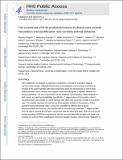The Conserved VPS-50 Protein Functions in Dense-Core Vesicle Maturation and Acidification and Controls Animal Behavior
Author(s)
Ailion, Michael; Paquin, Nicolas Robert; Murata, Yasunobu; Froehlich, Allan C; Pender, Corinne Lenore; Constantine-Paton, Martha; Horvitz, Howard Robert; Omura, Daniel T.; ... Show more Show less
Downloadnihms754841.pdf (1.150Mb)
PUBLISHER_CC
Publisher with Creative Commons License
Creative Commons Attribution
Terms of use
Metadata
Show full item recordAbstract
The modification of behavior in response to experience is crucial for animals to adapt to environmental changes. Although factors such as neuropeptides and hormones are known to function in the switch between alternative behavioral states, the mechanisms by which these factors transduce, store, retrieve, and integrate environmental signals to regulate behavior are poorly understood. The rate of locomotion of the nematode Caenorhabditis elegans depends on both current and past food availability. Specifically, C. elegans slows its locomotion when it encounters food, and animals in a food-deprived state slow even more than animals in a well-fed state. The slowing responses of well-fed and food-deprived animals in the presence of food represent distinct behavioral states, as they are controlled by different sets of genes, neurotransmitters, and neurons. Here we describe an evolutionarily conserved C. elegans protein, VPS-50, that is required for animals to assume the well-fed behavioral state. Both VPS-50 and its murine homolog mVPS50 are expressed in neurons, are associated with synaptic and dense-core vesicles, and control vesicle acidification and hence synaptic function, likely through regulation of the assembly of the V-ATPase complex. We propose that dense-core vesicle acidification controlled by the evolutionarily conserved protein VPS-50/mVPS50 affects behavioral state by modulating neuropeptide levels and presynaptic neuronal function in both C. elegans and mammals.
Date issued
2016-03Department
Massachusetts Institute of Technology. Department of Biology; Massachusetts Institute of Technology. Department of Brain and Cognitive Sciences; McGovern Institute for Brain Research at MITJournal
Current Biology
Publisher
Elsevier
Citation
Paquin, Nicolas et al. “The Conserved VPS-50 Protein Functions in Dense-Core Vesicle Maturation and Acidification and Controls Animal Behavior.” Current Biology 26, 7 (April 2016): 862–871 © 2016 Elsevier
Version: Author's final manuscript
ISSN
0960-9822
1879-0445